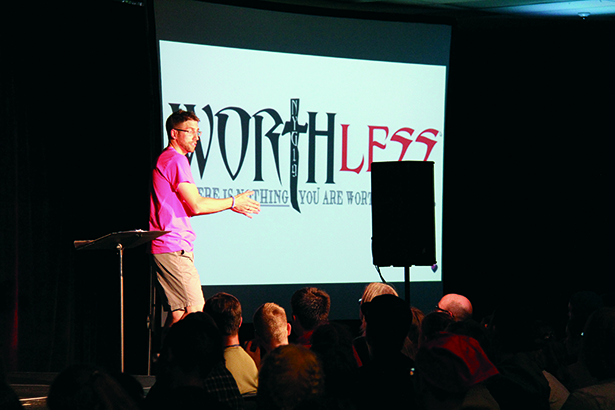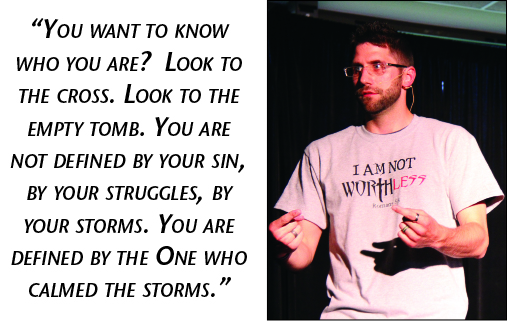Worthless?

by Glenn Worcester
My parents divorced when I was fifteen. After that, I lived with my mom while my brother stayed with my dad. Growing up, my brother was the “bad kid” (he got kicked out of high school in grade eleven for drugs), so I was the “good kid” by default.
But that wasn’t enough. I wanted to be the perfect kid. For me, that included having a perfect body. I started working out. And then I stopped eating.
For the next three years I was anorexic. Going through a divorce that I had no control over, I wanted something I could control—and that was my body. I located my worth in my body image. Some days I looked in the mirror and I felt good. I liked the way I looked. Most of the time I felt pretty good. I felt worthy. School was going well too, but that’s because I didn’t waste time doing things like… eating… or socializing… because when you have something to hide, it’s best to be antisocial; then you don’t have to hide anything at all.
But while things looked good on the surface, there was so much more under the surface that wasn’t good. There was so much in my life that did not measure up to how I wanted my life to look. My home life was a mess and my anorexia was an even bigger mess (even though it was what I thought I wanted in my life). My spiritual life was non-existent; I don’t really think I had faith then. And all the crap that was happening in life I was just burying so that I didn’t have to deal with it.
My life back then could be summed up in this way: “For many, of whom I have often told you and now tell you even with tears, walk as enemies of the cross of Christ. Their end is destruction, their god is their belly, and they glory in their shame, with minds set on earthly things” (Philippians 3:18-19). My god was my belly; it was food—or lack of food, really. That was the most important thing in my life. What lay ahead for me was exactly what Paul says: destruction.
Drowning in Galilee
One thing I did in my anorexia was to surround myself with food; the idea is that people don’t suspect you’re not eating when you’re always around food. So when I started university, I got a job in the cafeteria.
They had a policy that, when you worked, you got a free meal. I started to take advantage of the system and started taking more than I was allowed. I was stealing from the cafeteria. The third time I was caught I was fired on the spot and the manager told me to come back the next day. He was required to call the company, he said, and the company usually directed them to call the police and tell the school. At this point, I was a habitual stealer—just like a shoplifter—so I knew I might get kicked out of school or even arrested.
The next day I went back to the cafeteria. The manger told me: “Yep, they told me to call the cops and tell the school.” Then he looked at me and said: “I’m not going to do that.” And he let me walk away free.
This was one of those moments in life you never forget. It was like Peter, sinking in the sea of Galilee, sinking until Jesus reached out His hand and pulled him up.
Eighteen years ago, I wasn’t just sinking. I was drowning. And I didn’t call out to Jesus to save me; I didn’t even think or know I needed saving. Instead, He reached out and pulled me up, saved me from drowning, and brought me back to life.
Over the next few years I wrestled with the previous three years of my life and how far I had fallen from God’s grace. Even though I knew Jesus had picked me up and saved me, I wrestled for three years with the sins that had taken over my life. Stealing, living my life for food instead of God… that’s First Commandment stuff. Now, when I looked in the mirror, I saw my sins laid bare. And standing in God’s presence, I looked at myself and saw how worthless I was. I understood what Paul meant when he said he considered himself to be the worst of sinners (1 Timothy 1:15). That was me.
In our sin, we have nothing to offer God. He requires perfection. But we’re not perfect. He demands obedience. We obey everything but Him. In that knowledge, we stand before Almighty God and see ourselves as worthless in His presence. In the liturgy, sometimes we say: “I a poor, miserable, sinful being… confess to you all my sins and iniquities…” You can add “worthless” to that list. “I a poor, miserable, worthless, sinful being… confess to you all my sins and iniquities…”
When we look in the mirror, yes, we see our sin. We see the punishment that we deserve and we know there is nothing that we can do to save ourselves. But our word is not final. What we have to say about ourselves, good or bad, is not the end. It doesn’t matter if you’re a lifelong Lutheran or you’ve never set foot in a church. It doesn’t matter if you have a strong faith, a weak faith, or no faith, because this is where God steps in.
No matter what you feel today—worthless or worthy—your feelings come and go. God’s Word remains the same, and He says that there is nothing you are worth less than. That’s the message of Romans 5:8: “God shows His love for us in that while we were still sinners, Christ died for us.” There is nothing you are worth less than. That’s because He has created you, and you are here for a reason. And there is nothing you can do to make God love you less.
You are not worthless. You are God’s creation, His treasure, His priceless possession. Or rather, not “priceless,” actually; there is a particular price God paid for you. He paid Jesus’ life. That is your sticker price, that is your cost, that is your value—how valuable you are to God. That is how much you are treasured. “For you know that it was not with perishable things such as silver or gold that you were redeemed from the empty way of life handed down to you from your ancestors, but with the precious blood of Christ, a lamb without blemish or defect” (1 Peter 1:18-19).
Finding Your Worth in Christ
That was the plan all along. It’s the promise God made to Adam and Eve when they first messed everything up, not just for them, but for all of us as well. He promised a Saviour. Fast forward a few thousand years later and you see an innocent human being, who also just happened to be God, shed not only His blood but also His very life to cover up your guilt and shame and sin. That’s what Jesus Christ did for you. He covers you with His death, blood, resurrection, body, righteousness, and perfection.
His one righteous act brings justification and life to all people. His obedience to death, even death on a cross, makes you righteous. And Christ continues to give the Church—to give you—these blessings. He covers you again with His righteousness in Baptism. He washes away your sin, calling you to remember your Baptism daily—to remember all the wonderful things God has done for you through Jesus’ death and resurrection. And He gives you that forgiveness, life, and salvation in the Lord’s Supper too. These are the means of grace He’s given the Church.
That doesn’t mean we all of a sudden become perfect individuals who never sin again. But what it does mean is that any time we mess up, give into temptation, or fall, God is there to restore us, when we return to Him in repentance. Believe me, we need that mercy all the time. And God is always there to give it.
Sin wants to define us. Satan wants us to believe that we can’t come back from our sin. But it’s not true. I’ve had some big moments in my life where I’ve seen God pull me up out of the pit of sin and death. In order to do that, He went down into one—into a tomb, into hell. In His death and especially in His resurrection, Jesus tells us that our sin doesn’t define us.
So who are you? Scripture tells us: “For as in Adam all die, so also in Christ shall all be made alive” (1 Corinthians 15:22). You are made alive! “If anyone is in Christ he is a new creation; the old has gone, the new has come” (2 Corinthians 5:17). You are a new creation in Christ.

You want to know who you are? Look to the cross. Look to the empty tomb. You are not defined by your sin, by your struggles, by your storms. You are defined by the One who calmed the storms; who walked on water; who walked to Calvary; carried the cross; carried your sin, struggles, and shame; who was nailed to that cross; died on it; went down into the pit, but rose from the dead to give you the promise of eternal life, the promise for all who believe—the life that all those who have gone before us in the faith now have.
You may feel like you’re crumpled up, bruised, beaten, and crushed. You may have been told you’re worth nothing—told yourself that you’re worthless. But you have never lost value. You have not been abandoned, you have not been destroyed (Psalm 139:14, 2 Corinthians 4:8). You are not worthless.
If you ever doubt that, look to the cross, and see what God says you’re worth. You are worth the life of Christ.
That doesn’t mean you’ll never feel worthless again. But in the midst of that, we can do what Scripture tells us to do: “Fix [our] eyes on Jesus, the author and perfector of [our] faith, who for the joy set before Him endured the cross, scorning its shame and sat down at the right hand of the throne of God” (Hebrews 12:2).
We fix our eyes on Jesus. So, when you feel worthless, look to the cross. Look to the empty tomb. Look to the Lord’s Supper—the body and blood that was shed for you, for your forgiveness. And the Holy Spirit will help you to do this, to look to Christ. God will work in you faith, so that you will see that you are not worthless but rather His own precious child.
———————
Rev. Glenn Worcester is pastor of Peace Lutheran Church in Winnipeg. He served as headline speaker for Lutheran Church–Canada’s 2019 National Youth Gathering. This article is derived from his daily talks. Photo credits: Chanel Chursinoff.





